|
Vaccinations...Too Many, Too Often?
As time goes on, new
recommendations will be made by the veterinary
profession.
Be sure to consult with your own
veterinarian regarding this issue of vaccinations for dogs and
cats
because suggested protocols can change as newer
knowledge is gained.
Dog and cat owners
have been told by veterinarians and pet health care providers
for years that annual vaccinations for Rabies,
Distemper, Parvovirus, Feline Leukemia and on and on...are
required yearly. Annual 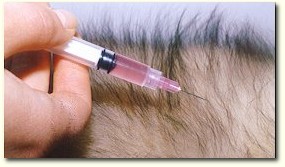 vaccinations, also called annual boosters, have
certainly played a major role in disease prevention in dogs
and cats. Nevertheless, the question recently on the
minds of dog and cat owners has been... Do these
vaccines have to be given every year?
Are we vaccinating dogs and cats too much? Are
we actually causing harm by
over-vaccinating? vaccinations, also called annual boosters, have
certainly played a major role in disease prevention in dogs
and cats. Nevertheless, the question recently on the
minds of dog and cat owners has been... Do these
vaccines have to be given every year?
Are we vaccinating dogs and cats too much? Are
we actually causing harm by
over-vaccinating?
UPDATE:
In the February, 2003 issue of DVMNewsMagazine an
article appeared summarizing recent preliminary suggestions
made by the AAHA. AAHA is the American Animal Hospital
Association.
Dr.
Richard Ford of the study taskforce evaluating the "state of
affairs" of vaccine recommendations indicated that the
guidelines for PUPPIES remains the same and that vaccine
manufacturer's suggested vaccine intervals should still be
followed for puppy immunization. For ADULT dogs, two
groups of vaccines can be considered...
CORE VACCINES and NONCORE VACCINES:
CORE VACCINES
include Rabies, distemper, Parvovirus and
Adenovirus-2
NONCORE VACCINES
Bordetella (Kennel
Cough), Parainfluenza, Lyme disease, Distemper-Measles
(combined) and Leptospirosis (all 4
types)
NOT
RECOMMENDED Adenovirus-1, Coronavirus and
Giardia
Many veterinarians believe that the Lyme Vaccine
has prevented thousands of cases of Lyme Disease and has been
a very effective and beneficial product. In certain
geographical areas, Lyme Disease is very seldom seen... so
possibly for dogs in that area, Lyme vaccination might not be
critical
There are two major questions
1.) Are multiple
agent (multivalent ) vaccines "overloading" the pets immune
system?
2.) Are "annual vaccinations" really necessary
annually?
Discussing the
first question of multivalent vaccines and whether or not they
are "stressing The Immune System we need to know a little
about how an individual (human, dog, cat, mouse) responds to a
pathogen. A pathogen is any agent such as a virus or bacteria
or poison that harms the individual. Every minute of every day
all individuals are being silently attacked by pathogens from
the air, food, water, and contents of our own intestinal
tracts. The true miracle is that any of us survive at
all!
Through eons of
evolutionary trial and error, those species who best defended
against pathogens were able to produce similar offspring who
were also immune competent, that is, able to fend off those
harmful invaders. So we can safely state that, in general,
those individuals alive today have healthy Immune Systems,but
some experts believe the overall state of health is declining,
and that vaccinations are contributing to the demise of our
immune systems.
The Immune
System is really a general term for all of the body's
pathogen defense mechanisms. The Immune
System is not a single, discrete system,
after all. There are a multitude of biochemical and anatomical
factors that make up The Immune System 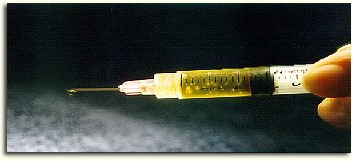
Are multiple agent
vaccines overloading The Immune
System?" With your knowledge that every
individual is continuously being challenged by invaders, it
seems unlikely that "ganging up" on The Immune
System is even possible. There is overwhelming
scientific evidence that a healthy body can respond with
immune defenses to multiple challenges and can make protective
levels of antibodies to a number of pathogens at the same
time!
With twenty-seven
years of experience in immunology, Robert Snyder, a
Public Health Advisor at the Centers For Disease Control, has
stated that there is "evidence that the more you stimulate
The Immune System the better it works." This
statement may very well be true, unless there is an
overwhelming number and virulence of pathogens.
On the other hand
there are knowledgeable individuals who would strongly
disagree. Veterinarian Christina Chambreau, an holistic
practitioner from Sparks, Maryland states that there are "all
kinds of problems with vaccinations and they are probably the
worst thing that we do for our animals". Her belief is
that by injecting vaccine into an animal we are effectively
by-passing the body's normal lines of defenses and presenting
to the animal foreign material in an unnatural manner.
Repetitive vaccinations, she contends, rather than providing
extra assurance that an animal will mount high levels of
antibodies, actually has an adverse effect on the animal's
overall ability to achieve a healthy balance within its
disease fighting talents.
If a small animal
practitioner with twenty-eight years of experience, has a hard
time reconciling these widely different viewpoints, how is the
pet owner to make sense of the present state of affairs? And
just to underscore the lack of uniformity of opinion regarding
multivalent vaccines, A survey of over twenty
veterinarians including Dr. Carvel Tiekert, Executive Director
of the American Holistic Veterinary Medical Association,
seeking evidence that "too many" vaccines were causing harm to
our pets. Not a single person queried would offer any
irrefutable evidence that the multivalent vaccines actually
harmed pets. There are stories, there are opinions, there are
theories, there is conjecture ... even suggestions that
veterinarians are knowingly using all those vaccines to
further their financial gains!
Multivalent vaccines are those that have more than one
antigen
combined into one injectible
unit.
A typical
multivalent vaccine is the DHLPPCv
vaccine for dogs. Instead of giving six
different injections, all these "vaccines" or antigens can be
given in a single small volume injection. Certainly this
is easier on the dog than getting six separate
injections.
DHLPPCv stands for:
D... Canine Distemper Virus...a
dangerous viral infection. "Distemper" is an odd name
for a viral infection and this disease has no relationship to
nor connection with a dog's temperament.
H... Hepatitis...a viral
infection caused by two related viruses that mainly affects
the liver.
L... Leptospirosis...a
bacterial infection affecting the kidneys. This class of
bacteria can infect humans, cows, dogs, pigs and other
mammals.
P... Parainfluenza...a virus
that along with the Hepatitis virus can cause upper
respiratory infections.
P... Parvovirus...a severe and
often fatal virus affecting the lining of the intestinal
tract.
Cv... Coronavirus...is very
similar to the Parvovirus, can be very severe, but has a
somewhat different effect on the intestinal tract and
generally is not fatal.
If you choose to
believe that multivalent vaccines (such as the DHLPPCv so
commonly used in dogs) are harmful to your pet and that only a
single antigen (vaccine) should be given at a time, you may
encounter difficulty since some vaccines are not available
individually. Keep in mind, though, that there are
decades of evidence gathered from millions that multivalent
vaccines are an effective and economical method of protecting
from disease.
The belief of some holistic practitioners that harmful
effects of vaccinating may not be recognizable for several
generations and that an individual may not show any signs of
vaccine derived diseases in its lifetime. But future
generations (offspring of the vaccinated animal) would not have
optimum immune fitness because of the previously given
vaccines. (offspring of the vaccinated animal) would not have
optimum immune fitness because of the previously given
vaccines.
Now we have to
factor into the vaccination equation whether the pet is
spayed/neutered or will be bred in order to make a proper
ethical evaluation as to current vaccination requests! The
choice is yours because there will always be health care
providers who disagree.
The question of
whether or not "annual vaccinations" really should be given
yearly is a good one. How often is Too Often? The only way we
would know if an individual should be vaccinated right now
would be to know that the individual is at high risk of
getting the disease. In other words, if there was a nice test
that would say "Yes, vaccinate immediately! This blood sample
indicates that the immune system's needs reeducating!," then
the choice to vaccinate would be simpler. Some types of
in-office blood tests are available at this time. A
complicating factor in duration of immunity after a vaccine is
given is the unique character of each individual's Immune
System.
What
manufacturers and distributors are
saying:
Pet owners should keep in mind that
when a laboratory conducts duration of immunity studies the
dogs and cats are healthy and kept in clean, parasite free
surroundings and are very well provided for. This is done not
only for humane reasons but also to be able to evaluate the
effectiveness of a vaccination over a period of time without
all the other common variables the average dog might face. In
reality it happens that dogs are vaccinated who have just been
released from weeks of confinement in a kennel or shelter, or
are parasitized, poorly fed or otherwise stressed. Will a
vaccine given to a stressed animal be as effective over a long
period of time as the same vaccine given to a normal, healthy
dog? The correct answer is: Maybe and maybe not. Each
individual is so unique that no prediction can ever hope to be
100 percent accurate for any dog, cat or human when we are
talking about what a vaccine will do. And that's a fact that
everyone agrees upon!
Dr. Michael LaRosh at
Fort Dodge Laboratories (one of the worlds largest
manufacturer's of animal vaccines) has stated that he hopes
someday there will be a practical and inexpensive way to
measure the overall immune competence of the individual.
"If, for example, a five year study indicates that one year
after receiving a vaccine, 90% of dogs are still protected
against the specific disease vaccinated for, and at three
years 70% are still protected and at five years 50% are still
protected ... what level of risk of disease will the pet owner
be willing to live with? Every dog owner will have a different
comfort zone and some owners may very well choose to vaccinate
yearly, not knowing if their dog is in that group of 10% of
vaccinates who don't hold an adequate level of immunity
after one year. Some pet owners may have a comfort zone at the
three year-70% protection probability level and some will
vaccinate every five years.
Dr. Race Foster of
Drs. Foster and Smith, Inc., asks the question "If vaccines
really do cause subsequent autoimmune reactions, why arenít
animals coming down with autoimmune diseases after natural
exposures to the disease? Some dogs and cats may 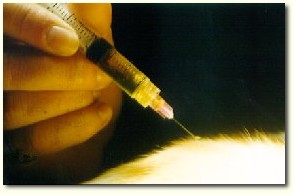 develop immune disorders subsequent to being
vaccinated but it is very hard to prove if the vaccine
actually triggered the problem." develop immune disorders subsequent to being
vaccinated but it is very hard to prove if the vaccine
actually triggered the problem."
And as far as making
a standard recommendation for vaccinations, he believes that
there are so many variables in each individual dog and cat
that a number of considerations should be explored regarding
how many vaccines are administered and how often.
Dr. Foster goes
on to ask "Is a vaccine failure really a fault of the
vaccine, or a failure of the individual to make protective
immunity to the vaccine? If a dog develops an autoimmune
disease subsequent to a vaccination why donít all dogs develop
problems from that product? If a veterinarian had ten dogs in
front of him to vaccinate, there would be ten different immune
systems that would accept the vaccine each in a unique way.
Pet owners should keep in mind that no vaccine for humans or
pets is 100% protective, 100% safe, in 100% of the recipients
of the vaccine."
Dr. Foster's remarks
bring up another current hot topic ... do vaccines promote
autoimmune diseases? Briefly, an autoimmune disease
refers to a broad range of ill effects brought on by an
abnormal response that The Immune System
makes to things it wouldn't ordinarily respond to.
Something triggers or
stimulates the body to react to its own tissues, to look at
its own tissues as if they were invaders! A good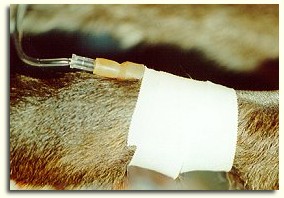 example is autoimmune hemolytic anemia where the
body's own red blood cells are destroyed by The Immune
System because something told The Immune
System that the red blood cells are pathogens,
invaders, foreign tissue ... so a battle rages within and can
ultimately cause the individual's death! example is autoimmune hemolytic anemia where the
body's own red blood cells are destroyed by The Immune
System because something told The Immune
System that the red blood cells are pathogens,
invaders, foreign tissue ... so a battle rages within and can
ultimately cause the individual's death!
Infectious disease
agents occasionally trigger immune mediated diseases.
Are vaccines also a culprit in stimulating adverse immune
mediated problems? We must resist the temptation to condemn
all vaccines because of occasional failures or complications.
There are people who will tell you that no vaccine is safe or
effective and that they actually cause more diseases than they
prevent. Conversely, a very strong case could be made that
vaccinations have prevented far more death and disease than
any perceived harm they may have done.
It is suggested
that you do some searching on your own through recent dog and
cat magazines, the library, your veterinarians borrowed text
books (Please bring 'em back!), or the Internet. After a few
hours of research you will most certainly gain an insight into
the pros and cons of vaccinating; you will begin to approach a
personal vaccine comfort zone. But I'll bet you still won't
have a firm conviction as to what exactly constitutes too many
or too often! Here's an important word of caution about
using the Internet: You cannot believe everything you
read on the internet . Nuff said.
There are
claims that dogs and cats are the innocent victims of
over-vaccination. It is said that too many vaccines, given too
often, results in autoimmune diseases, arthritis, cancer,
behavioral problems and so on. We have to be careful when we
blame one specific practice (vaccinations) for causing such
universal harm!
Some veterinary associations unofficial
recommendations:
Vaccinate puppies and kittens against the clinically
important infectious agents such as distemper virus,
parvovirus, panleukopenia and rabies.
Avoid
vaccinations before 6 weeks of age. Give 2 to 4 doses of
vaccine spaced 2 to 4 weeks apart.
Give annual booster
vaccine at 1 year and give boosters every 3 years, unless
otherwise required by law.
Monitor serum antibody
levels annually between boosters. (This means that your dog or
cat should have a blood test done to measure the level of
"immune memory" to a disease.)
*Geriatric animals
generally do not need booster vaccinations. Monitor serum
antibody titers instead.
Dr. W.
Jean Dodds, a noted researcher and immunologist in Santa
Monica, CA suggests that when giving a Rabies vaccine... not
to administer it at the same time as other vaccines. Three to
four weeks later, other vaccines can be given but Dr. Dodds
believes that after ten years of age booster vaccines are
generally not needed and may even be unwise. "For animals
previously experiencing adverse vaccine reactions or breeds at
higher risk for such reactions (e.g. Weimaraners, Akitas,
Harlequin Great Danes), alternatives to booster vaccinations
should be considered. These include avoiding boosters except
those required by law such as Rabies; measuring serum titers
annually for specific diseases; and considering homeopathic
alternatives to vaccinating. You may contact the
following for other recommendations
The American
Veterinary Medical Association 1-847-925-8070
The American
Animal Hospital Association 1-800-252-2242
The American
Holistic Veterinary Association
1-410-569-0795
What
should a pet owner to do?
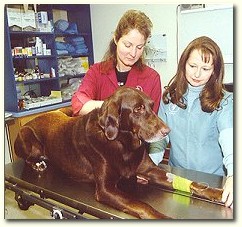 Realize that pet health care providers who truly have
your pet's best interest at heart, do not all agree on what is
the ideal vaccination protocol to follow. Accept the fact that
some pet health care providers truly believe that across the
broad spectrum of optimum health, vaccinations throw the
animal's vital energies out of balance. The truth is that
vaccines have undoubtedly prevented countless millions of
disease related deaths. Realize that pet health care providers who truly have
your pet's best interest at heart, do not all agree on what is
the ideal vaccination protocol to follow. Accept the fact that
some pet health care providers truly believe that across the
broad spectrum of optimum health, vaccinations throw the
animal's vital energies out of balance. The truth is that
vaccines have undoubtedly prevented countless millions of
disease related deaths.
An educated and
informed judgment that needs to be made when considering the
risks versus the benefits of vaccinating the pets in our care.
Keep an open mind and a sensitive heart to this issue of
vaccinations. If you do have concerns that need addressing,
tell your veterinarian that you would like to consider all the
options prior to vaccinating your special pet.
Someday, hopefully
soon, when we discuss vaccinating our pets, no one will have
to ask if we are giving Too Many, Too Often.
|





